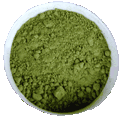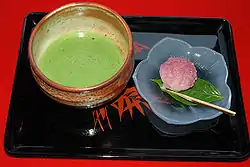抹茶
Chinese
girdle; brassiere; to plaster girdle; brassiere; to plaster; play; to smear |
tea; tea plant | ||
|---|---|---|---|
| trad. (抹茶) | 抹 | 茶 | |
| simp. #(抹茶) | 抹 | 茶 | |
Pronunciation
Japanese
| Kanji in this term | |
|---|---|
| 抹 | 茶 |
| まつ > まっ Grade: S |
ちゃ Grade: 2 |
| on’yomi | |


Alternative forms
- (honorific) お抹茶 (o-matcha)
Noun
References
- Matsumura, Akira, editor (2006), 大辞林 [Daijirin] (in Japanese), Third edition, Tōkyō: Sanseidō, →ISBN
- NHK Broadcasting Culture Research Institute, editor (1998), NHK日本語発音アクセント辞典 [NHK Japanese Pronunciation Accent Dictionary] (in Japanese), Tōkyō: NHK Publishing, →ISBN
- Kindaichi, Kyōsuke et al., editors (1997), 新明解国語辞典 [Shin Meikai Kokugo Jiten] (in Japanese), Fifth edition, Tōkyō: Sanseidō, →ISBN
This article is issued from Wiktionary. The text is licensed under Creative Commons - Attribution - Sharealike. Additional terms may apply for the media files.